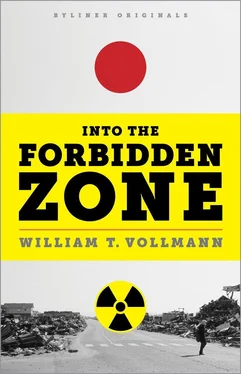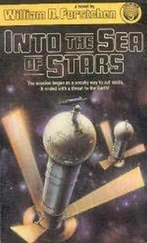We rolled along, and at the side of the road, not long after we had seen some wooden boxes which the driver said were employed for the collection of wild bees, a sandwich-board-type sign unimpressively announced: ENTRY RESTRICTED BY POLICE. And so we came into Kawauchi Village, ten kilometers from the inner ring. The houses were silent. The driver said, “They may have evacuated. This is no good.”
On the hillside just off the road rose a pleasant wooden house. Seeing an old man in wading boots performing some chore, I asked the driver to stop again, and the interpreter and I went out to introduce ourselves to Mr. Sato Yoshimi, who said, “I went to Koriyama to evacuate, but just returned today.”
“Why did you return?”
“I’ve been there at Big Palette for about a month, and I just had to look at my house. I’ll go back to Big Palette today.”
“What made you choose to move there?”
“People here were told, If you’re within twenty kilometers, you have to evacuate. If you’re within thirty kilometers, you might want to. So, to be on the safe side, this village was specified for evacuation.”
I did not completely understand this; but who precisely had specified the evacuation, and how voluntary it was, might not be something the broken-toothed old man cared to spell out. His white mask hung down between chin and neck.
“How did you experience the earthquake?”
“I was at the site,” he answered. “I was working at the Number Four Turbine. I’ve been working at the reactor for more than thirty years.”
“Was it a good job?”
“Well, before the accident I enjoyed it. You never imagined. .”
“And then what happened?”
“It was about 2:30. Within the building the tremor was terrible, and the lights started to fall. Lots of sand and dust — you couldn’t see where you were going. I was within the controlled area, where you have to wear protective gear specified by Tepco, and you have your own dosimeter.”
“Do you still have it?”
“I left it in the reactor building.”
“Did you see the tsunami?”
“I immediately evacuated before it came. From the Number Four building I went on foot with my colleagues. There was lots of water leaking from pipes, since the ground had sunk. You work in a team — six people. All of us evacuated together. There is an office four kilometers from there. We checked in there. When everyone had arrived, we were told to go wherever on our own responsibility.”
His employer was a subcontractor of Tepco, called Nito Resin. They were still paying him, he said; he had received last month’s salary.
“How long do you suppose you’ll be living at Big Palette?”
“I don’t know. It depends on the radiation here. Unless the restriction is lifted, I don’t think I can come back. Here it’s pretty low, 0.5 or 0.6 millisieverts. 37My daughter is within the twenty-kilometer limit. So she and her mother went to see their home. 38I think they can enter for a short time.”
A brown creek flowed beneath the cypresses at the edge of his steep lot. Across the road lay his garden: daikons, green onions, cabbage, long beans. I wish I could tell you whether anyone ought to have eaten what he was growing.
Bowing our goodbyes to him, we continued on down the road, while he, bending painfully there in the driveway, slowly returned to watering a plant with his turquoise plastic pitcher, while a young child cried inside his house, my dosimeter still pleasantly at 2.7. When we reached the fork we took the right-hand turn as he had advised, while the driver said, “Normally, reactor workers die at an early age, so I’m surprised, frankly, that he’s still alive. One of my friends was working there, and he wanted to retire. He opened a noodle shop and died very soon.”
“How old was he?”
“Forty-something.”
“Was it cancer?”
“I don’t know the details.”
This anecdote said more about the driver than it did about the reactor, or nuclear power. Anyhow, one person is a small sample. Passing more dry rice fields, my forehead burning and itching, perhaps from an insect bite, we passed two dogs running loose outside the Kawauchi municipal office and reached the inner ring, where a line of police stood in their blue vests with reflective yellow stripes, their white masks covering from their chins to the bridges of their noses and their white hats firm and straight over their eyes, their white-gloved hands open at their sides and their boots shining. They prohibited us from going further, so I had the taxi driver turn right and park a block away, on a street where locals drove in and out of an unmanned checkpoint as they pleased, lifting the flimsy barrier aside. These people were always in a hurry. Whenever the interpreter and I waved them down, they would always say, in violation of their famous Tohoku politeness, “No time!” Invariably, they were headed for Big Palette.
I strolled into the forbidden zone, just so I could say I had done it. The interpreter took a cautious step or two behind me, then stopped. The driver sat with the windows rolled up. Every time I looked at him, he anxiously started his engine. Should I have insisted that he continue into the involuntary evacuation zone? My dosimeter had not registered any recent increase; regarding gamma rays the situation seemed safe enough, and perhaps this story would have been more dramatic had I been pushier, but then again perhaps not, for what would we have seen but more empty houses, and then quake and tsunami damage, and then the reactor, which drone photographs in the newspaper made clear resembled any number of muddy construction sites? I think the driver would have done it if I had asked; as for my loyal, courageous interpreter, she said simply, “I will follow you.” Perhaps she and I should have suited up with respirators, yellow kitchen gloves, and all the rest of it, and then walked toward Plant Number One. Honestly, I lacked the ruthlessness to ask it of her. Or I could have set out by myself, leaving the two of them to wait for me there. Why didn’t I do that? Perhaps I was afraid and didn’t admit it to myself; but I believe I simply couldn’t see the point.
The birds were singing, the plants were growing, and the trees were coming into flower. It was very warm now. Moss grew on a wall, and in the deserted houses the curtains were all drawn. If you can, try to see those curtained houses and the shadows on their silver-ringed roof tiles, the blue flowers in someone’s backyard, which like the other lawns there still appeared decently trimmed, probably due to the coolness of the season. At the side of another house, a few potted houseplants had begun to wither, but the others still looked perfect. Perhaps more people had returned home from Big Palette than was generally imagined.
Behind an outer door, an inner sliding partition was wide open. We called and called, but no one answered. I informed the checkpoint police, since last night’s taxi driver had remarked that burglars had begun to take advantage of the evacuation.
In the shade of an old wooden house, several bicycles leaned neatly beside clean shovels. A line of sandbags, perhaps tsunami protection, followed the house around the corner.
What is there to say about this place, morning-shadowed and birdsonged, the meter at 2.7 millirems, the shadows of power wires gently dancing across the ribbed concrete facade of a workshop, a small black beetle crawling on a sandbag?
From the main checkpoint a bus emerged, then a truck, then three cars, the police waving them all through with their white-gloved hands before they reclosed the barrier and these vehicles all headed back in the direction of Koriyama. Then a man on a motorcycle approached them from our side.
“Unless your purpose is very strong I cannot allow you,” a policeman told him.
Читать дальше












